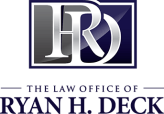A criminal record can affect your ability to get a job, rent an apartment, or even apply for specific licenses. Fortunately, in Texas, some people may qualify for an expunction, which removes an arrest or charge from their record. If you've been arrested or charged with a crime and want to move forward with a clean slate, here's what you need to know about expunctions.
Why Getting an Expunction Is a Good Idea
Even if you were acquitted of a crime, having an arrest or charge on your record can create problems. Here's why an expunction can be beneficial:
Even if you were acquitted of a crime, having an arrest or charge on your record can create problems. Here's why an expunction can be beneficial:
- Better job opportunities – Many employers run background checks, and having a clean record can make it easier to get hired.
- Benefits housing applications – Landlords often check criminal records, and an expunction can prevent a past arrest from affecting your chances.
- Restoring your reputation – Even dismissed charges can appear in public records. An expunction ensures they are erased.
- Peace of mind – Knowing your past mistakes aren't following you can bring relief and a fresh start.
Who Qualifies for an Expunction in Texas?
Not everyone qualifies for an expunction. Texas law allows expunctions in certain situations, including:
- You were arrested but not charged – If you were arrested but never formally charged, you may be eligible to have the arrest removed from your record.
- Your charges were dismissed – If your case was dismissed without a conviction, you might qualify for an expunction.
- You were acquitted (found not guilty) – If you went to trial and were found not guilty, you can request an expunction.
- You received a pardon – If you were convicted but later received a pardon, your record may be cleared.
- Certain misdemeanors as a minor – Some juvenile offenses and alcohol-related offenses committed before age 21 may be eligible for expunction.
If you were convicted of a crime (except in cases of a pardon), an expunction is likely not an option. However, some convictions may be eligible for a non-disclosure order, which seals the record from public view but doesn't erase it.
Common Situations for Expunctions
Expunctions are more common than you might think. Here are some examples:
- Wrongful arrest – You were mistakenly arrested for someone else's crime, and the charges were dropped.
- Dropped charges – You were arrested for theft, but the store declined to press charges, so the case was dismissed.
- Not guilty verdict – You were accused of assault, but the jury found you not guilty.
- Old minor offense – You were arrested for underage drinking at 18, but now you're 30 and want it off your record.
If these scenarios sound familiar, an expunction could help you clear your name.
The Expunction Process: What to Expect
Getting an expunction requires filing a legal request with the court. Here's how the process typically works:
- Determine eligibility – A lawyer can help determine if your record qualifies for an expunction.
- File a petition – You or your attorney must file a formal request (petition) with the court in the county where the arrest or charge took place.
- Court review – A judge will review your petition, and a hearing will be scheduled if necessary.
- Approval and order – If approved, the judge will sign an order directing law enforcement and other agencies to erase your record.
- Record destruction – Once granted, agencies like the police department, courts, and background check companies must remove any records of the arrest or charge.
This process can take several months, but once completed, the expunged record will no longer appear on background checks.
Expunction with a Williamson County Criminal Defense Attorney
Texas law surrounding expunctions can be complicated, and filing paperwork incorrectly may delay or prevent approval. Working with an experienced criminal defense attorneycan help ensure your petition is handled correctly.
Expunctions can open new doors—don't let a past mistake hold you back. Law Office of Ryan Deck offers consultations to determine if a case is eligible for expunction.




